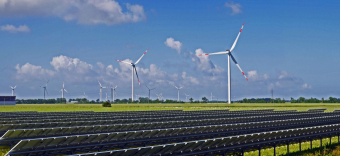
Organizing capital, in isolation, isn’t enough to get hundreds of Elon Musks dedicating themselves to building companies that develop critical new wind, solar, nuclear and battery technology.
In June, Hemant Taneja attended a breakfast organized by Energy Secretary Ernest Moniz and Bill Gates, with top business and policy leaders from around the world. The investors in the meeting were dedicated to increasing funding of early-stage energy companies. Of course, that’s a much-needed step. As the data below shows, exponential decrease in solar costs has led to exponential increase in solar capacity, despite limited technology investment. This has been principally driven by consistent, long-term policy that drove deployment at scale.
Uber and Tesla show that when companies create amazing consumer experiences, large, fragmented markets can organize fast around a new solution. Customer adoption of Uber, the enthusiasm for Tesla electric cars, and advances in self-driving vehicles have brought the transportation sector to a point of no return. The days of internal combustion engine and gasoline are numbered. Just think about that: in less than a decade, cars running on electric power will be a utility that we can access on demand. Far fewer of us will own cars. The most in-demand new cars will be electric. That is an amazing step forward towards reducing CO2 in the atmosphere.
The swift change to electric-powered transportation makes it all the more important to transform the 21st-century electricity system. An effective way to do that will be to employ the lessons from Uber and Tesla and let entrepreneurs lead the established companies.
How? A crucial early step will be to align utilities with entrepreneurs instead of against them. Let’s create regulatory and business models that give utilities a path to evolve their role from operating mammoth power plants and transmission grids to operating software-powered platforms that interconnect the small-scale power solutions in homes and small businesses. This then becomes a platform that supports entrepreneurial solutions, much like the internet or the iPhone and app store. Utilities can prosper, providing reliability and resiliency in the power network, while faster-moving entrepreneurs create ever more effective ways to generate, move, trade, market, share and store power.
Entrepreneurs will come in hoards to tackle this great mission if they can take advantage of the economies of unscale that have propelled other sectors. Airbnb is an unscaled response to hotels, re-assembling demand for places to stay in a whole new way. The Honest Company took advantage of unscaling to profitably compete against Procter & Gamble in consumer brands.
What can entrepreneurs do in the field of energy? One important role: solve the problem of power storage. A major barrier to unscaling electricity is that it can’t be stored effectively. Tesla and a number of global companies are racing to build affordable battery technology for homes and businesses. Once energy can be stored cost effectively in small quantities, much less of it needs to be produced centrally and distributed on power grids.
Put all of this together, and this is systems thinking about the problem. It follows market principles, centering solutions around what customers actually want. We need to bring to the power industry the same mindset we apply to internet-based “utilities” like Facebook and Google. After all, how are they any less important to life today than energy?
If we do this right, no utility will ever again build a large-scale carbon-based power plant. Such a thing won’t be necessary if every home is generating electricity on its roof and the grid works more like the internet, moving power to where it’s needed and storing excess in new-age batteries for reliable access. Just as anyone can now be a hotelier because of Airbnb, in a decade anyone will be able to be a power company once these new technologies are in place. In an unscaled era, the mini power plant in a home or small business will be better, cheaper, cleaner and more resilient than the next massive power plant.
Customers will have choices, and if new energy technologies are better, cheaper and cleaner than old ones, that’s what customers will choose.
Source: weforum.org



